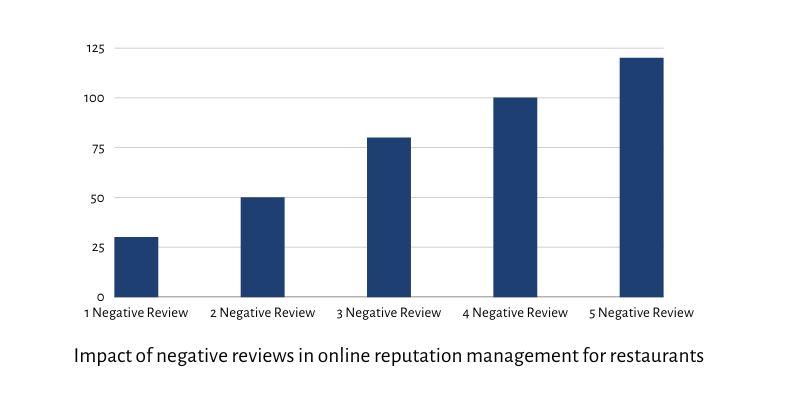 May 31, 2023
May 31, 2023

Have you ever wondered how a single negative review can impact the success of a restaurant? In today’s digital world, where online reputation holds immense power, a restaurant’s fate can be shaped by the opinions of its customers. Welcome to the realm of “Online Reputation” – a force that can make or break businesses. With 9 out of 10 consumers relying on online reviews to make dining decisions, the significance of managing online reputation has reached new heights.
This article will unravel the importance and effects of a bad online reputation, exploring how it can send shockwaves through the restaurant industry. Let’s explore the captivating world of online restaurant reputation management together.
The view and opinions that people or organisations have online are referred to as their “online reputation.” It includes how consumers view your company’s name, goods, or services in light of web information. The importance of internet reputation on consumer behaviour, public perception, and the success or failure of both individuals and corporations is what gives it its power. Key elements of the influence of internet reputation are as follows:
Online reputation holds tremendous influence over businesses, and the restaurant industry is no exception. Think about it: when did you last try a new restaurant without first checking its online reviews? Unfortunately, the answer is likely never.
Statistics further solidify the influence of online reputation, and according to a recent survey, 93% of consumers read online reviews before making a dining decision. This means that a vast majority of potential customers are heavily influenced by the experiences and opinions shared by others. Positive reviews can act as a powerful endorsement, while negative reviews can be a red flag, prompting customers to seek alternatives.
Customers turn to online reviews for guidance when faced with multiple dining options. They seek reassurance that their hard-earned money will be well spent and that they will have a pleasant dining experience. A positive online reputation creates a sense of trust and credibility, making customers more likely to choose a restaurant. On the other hand, a bad online reputation casts doubt and raises concerns about the quality of service, food, and overall experience.
Consider the scenario of a couple searching for a romantic restaurant for their anniversary dinner. They come across two establishments with similar menus and pricing. However, one restaurant has numerous positive reviews praising its cosy atmosphere, impeccable service, and delectable dishes, while the other has a mix of negative and mediocre reviews. As a result, the couple will likely opt for the restaurant with a better online reputation, which offers higher confidence and assurance.
In today’s digital age, where an online presence can make or break a business, a bad online reputation can have profound consequences for restaurants. Let’s dive into the detrimental effects of a negative online reputation on a restaurant’s success.
Negative reviews and incidents can erode customer confidence in a restaurant. Imagine a potential customer searching for a place to celebrate a special occasion. They come across a restaurant with a string of negative reviews, complaining about poor service, unappetizing food, and unpleasant experiences. Such negative feedback undermines the trust and confidence customers have in the restaurant. Studies show that 94% of consumers hesitate to purchase from a business with negative reviews. This loss of trust can significantly impact a restaurant’s ability to attract new customers and retain existing ones.
A bad online reputation can directly impact a restaurant’s revenue stream. When negative reviews and incidents become prominent online, it leads to a decline in footfall and revenue. Research suggests that a single negative review can cost a business approximately 30 customers. This customer decline can lead to decreased revenue, making it challenging for the restaurant to cover operational costs, pay staff, and achieve profitability.

It’s not just the customers who bear the brunt of a bad online reputation; employees are also affected. When a restaurant’s reputation takes a hit, employee morale can plummet. Negative reviews and public criticism can demotivate staff members, leaving them disheartened and disengaged.
After all, who wants to work in an environment where the business they represent is constantly criticized? Moreover, a negative reputation can make it difficult for a restaurant to attract and retain talented employees. Top-tier professionals will likely seek opportunities in establishments with a positive reputation and better work environments.
Online reputation management must include elements that address customer perception and trust. Customers’ trust, decision-making, and level of involvement are significantly influenced by how they view a company or person online. Building trust and influencing favourable consumer perception are the goals of effective online reputation management tactics. The connection between client perception, trust, and online reputation management is examined in more detail below:
Customer perception and trust play a pivotal role in the success of a restaurant. It goes beyond just delivering a delicious meal; it encompasses customers’ overall experience from entering the establishment to leaving.
Positive reviews and feedback act as powerful endorsements for a restaurant. They provide social proof that the establishment consistently delivers excellent service and high-quality food. According to research, 92% of consumers are more likely to trust recommendations from friends and family over any other form of advertising. Positive online reviews are akin to personal recommendations from strangers, contributing to positive customer perception and trust. They serve as a vote of confidence, attracting new customers and reassuring existing ones that they have made the right choice.
While positive reviews are crucial, negative reviews cannot be ignored. They significantly impact customer opinions and can tarnish a restaurant’s reputation. Studies indicate that customers are twice as likely to share a negative dining experience compared to a positive one. Negative reviews can sway potential customers away from a restaurant, shaping their perception and causing them to seek alternatives. It highlights the importance of addressing negative feedback promptly and professionally to mitigate the damage and demonstrate a commitment to customer satisfaction.
Public perception can make or break a restaurant’s success. A strong, positive reputation generates buzz, attracts more customers, and builds a loyal following. On the other hand, a negative perception can hinder growth and deter potential customers.
Public perception extends beyond online reviews and encompasses factors like word-of-mouth recommendations, social media presence, and overall brand image.
Managing and improving online reputation requires a proactive approach and a commitment to customer satisfaction. So let’s explore some practical steps and strategies restaurants can implement to effectively manage and enhance their online reputation.
To stay ahead of the game, restaurants must actively monitor their online presence and review platforms. Regularly checking review sites, social media platforms, and other online channels allows restaurants to stay informed about customer feedback, both positive and negative. By proactively listening to customer opinions, restaurants can identify areas of improvement and address issues promptly, demonstrating a dedication to customer satisfaction.
Encouraging customers to leave positive reviews is a powerful strategy to improve online reputation. Happy customers are often eager to talk about their positive experiences but may need a gentle nudge. Restaurants can consider implementing strategies such as offering incentives, like vouchers, discount coupons, or freebies, for customers who leave a review. Additionally, training staff to request feedback at the end of a meal or sending follow-up emails requesting reviews can help generate more positive reviews and boost the restaurant’s online reputation.

Negative reviews are inevitable, but how restaurants handle them makes a difference. Responding to negative feedback professionally and promptly is crucial for online reputation management. It’s essential to acknowledge the customer’s concerns, apologize if necessary, and offer a solution or a way to rectify the situation. This demonstrates a commitment to addressing issues and shows potential customers that the restaurant values their feedback and strives for improvement.
A paramount solution for improving and proficiently managing online reputation is delivering exceptional customer experiences. By prioritizing customer satisfaction, restaurants can create positive memories that customers will be eager to share online. In addition, ensuring friendly and attentive service, maintaining high-quality food and beverage offerings, and paying attention to details that enhance the overall dining experience can generate positive reviews and build a robust online reputation.
In conclusion, the importance of online reputation for restaurant businesses cannot be overstated. A positive online reputation builds customer trust and confidence, leading to increased patronage and profitability. On the other hand, a bad online reputation can have detrimental effects, including decreased customer trust, declining revenue, and challenges in employee morale and retention.
By implementing strategies to manage and improve online reputation, such as monitoring online presence, encouraging positive reviews, addressing negative feedback professionally, and delivering exceptional customer experience, restaurants can shape their reputation, attract more customers, and secure long-term success in the competitive digital landscape. So, prioritize your online reputation and watch your restaurant thrive in the digital age.
CraftedQ, a one-stop shop for all your digital needs, has a talented team of digital experts. Over the past 15 years, CraftedQ has completed 300+ successful projects and boasts 100% quality assurance. So what are you waiting for? Contact our digital experts today and start your journey toward online reputation management.
